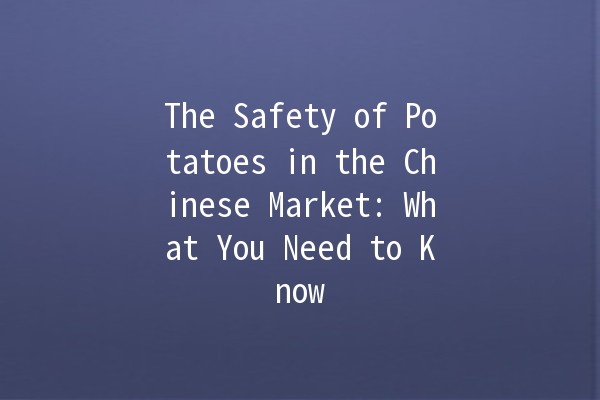Potatoes are a staple food for many around the world, but their safety, particularly in specific markets like China, raises important questions. Are imported potatoes safe to eat? What about domestically produced varieties? Understanding these issues is essential for consumers who want to make informed choices about their food. In this article, we delve into the safety of potatoes in the Chinese market, discussing potential risks, regulatory standards, and practical tips for ensuring that the potatoes you consume are safe and healthy.
Understanding Potato Safety Concerns
Potato safety involves multiple layers, including agricultural practices, handling, storage, and transportation. In China, various factors contribute to potential safety concerns:

Key Safety Regulations in China
The Chinese government has established numerous regulations meant to ensure the safety of food products, including potatoes. Some key regulatory frameworks include:
National Food Safety Standards: China maintains a set of national food safety standards (GB standards). These standards cover pesticide residues, contamination limits, and hygiene practices in food production.
Certification and Quality Control: Potatoes, particularly those that are exported or imported, may require certification proving that they meet specific safety and quality standards.
Monitoring and Inspection: Regulatory agencies conduct routine inspections and monitoring of food products to ensure compliance with safety standards, aimed at protecting consumer health.
Five Practical Tips for Ensuring Potato Safety
Ensuring the safety of potatoes in your diet can be greatly enhanced by following these practical tips:
When purchasing potatoes, choose trusted supermarkets or local farmers' markets where product quality is more transparent. Look for certifications or seals that indicate compliance with safety standards.
Example Application:
In urban areas like Beijing or Shanghai, seek out established grocery chains that follow strict safety protocols or consider joining a communitysupported agriculture (CSA) program that connects consumers with local farms.
Inspect potatoes for discoloration, soft spots, or signs of sprouting. These could indicate that the potatoes are past their prime and may harbor bacteria or toxins.
Example Application:
Before cooking, take the time to sort through your potatoes. For any that show visual spoilage, discard them instead of exposing healthy potatoes to potential pathogens.
Potatoes should be stored in a cool, dark, and dry place to avoid sprouting or rotting. Unlike many vegetables, potatoes should not be refrigerated, as cold temperatures can alter their flavor.
Example Application:
Invest in a breathable bag or basket for storing potatoes in your pantry, ensuring that they remain ventilated and away from direct light.
Always wash potatoes thoroughly under running water before cooking to remove dirt, pesticide residues, and potential pathogens. Cooking potatoes at high temperatures can kill most pathogens present.
Example Application:
Before making mashed potatoes or any other dish, scrub the potatoes with a vegetable brush and rinse them under water. Peeling the skin can also help mitigate risks, especially in commercially grown potatoes.
Be aware of food recalls associated with potatoes or potato products. Regulatory agencies often announce recalls for products that are found to be contaminated or unsafe.
Example Application:
Follow local news outlets or subscribe to online food safety newsletters to receive timely information on any product recalls that may affect your household.
Frequently Asked Questions
Pesticide residues on potatoes can vary based on the region and agricultural practices. Common pesticides include chlorpyrifos and carbendazim. Regular testing helps identify and manage these residues. Always check relevant food safety resources for updates on acceptable limits for these substances.
In China, while genetically modified (GM) potatoes are not widely available for consumers, it is still advisable to purchase organic or nonGM certified products, which are less likely to be genetically modified. Labels that indicate the produce is organic can help gauge its status.
Safety can vary between imported and locally grown potatoes based on farming practices and regulations in each country. Imported potatoes may undergo stricter testing and certification processes before entering the Chinese market, which could enhance safety. However, it's essential to evaluate the source and quality of both domestic and imported potatoes.
The Chinese government conducts inspections and monitors food products to enforce national food safety standards. They also require importers and suppliers to adhere to strict safety regulations, allowing consumers to have better access to safe food options.
Signs of foodborne illness can include symptoms such as nausea, vomiting, diarrhea, or abdominal cramps. If these symptoms occur after consuming potatoes, it is essential to consult a healthcare professional. Keeping a food diary can help trace back potential sources of foodborne illness.
Peeling potatoes is not mandatory, but it can be beneficial in reducing exposure to pesticides and contaminants that may reside on the skin. If you choose to keep the skin, make sure to wash them thoroughly before preparation.
, the safety of potatoes in the Chinese market involves several facets, from agricultural practices to regulatory systems. By understanding these dynamics and taking necessary precautions, consumers can enjoy potatoes safely while reaping their nutritional benefits.
With this information, you can make informed decisions about your potato consumption, ensuring your meals are both delicious and safe. Enjoy your cooking adventure with these versatile vegetables!